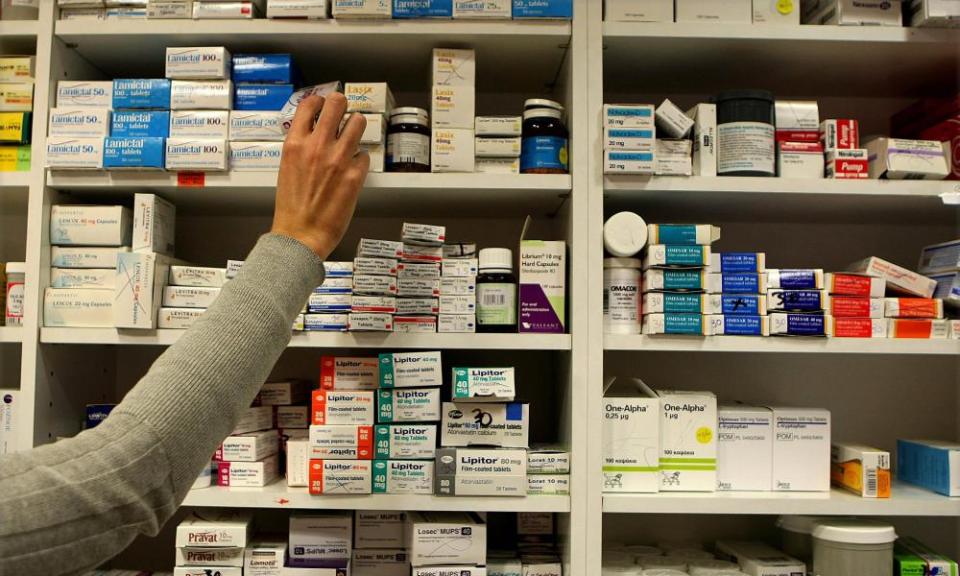Pregabalin, known as 'new valium', to be made class C drug after deaths

A prescription drug described as the “new valium” is to be classified as a class C controlled substance after it was linked to a growing number of UK deaths.
Pregabalin – a substance used to treat nerve pain, epilepsy and anxiety – is increasingly being handed out too readily and being used recreationally, according to doctors and pharmacists. They say that when it is mixed with other substances it can lead to overdose. Deaths connected to pregabalin have risen from four in 2012 to 111 last year, according to the Office for National Statistics.
Data provided by NHS Digital shows that prescriptions for pregabalin have shot up more than 11-fold in the last decade, from 476,102 in 2006 to 5,547,560 last year. The government has now accepted in principle that pregabalin should be reclassified as a class C controlled substance, which would mean patients could not obtain a repeat prescription.
Yasir Abbasi, a consultant psychiatrist and clinical director for addiction services at Mersey Care NHS foundation trust, said the rising prescription numbers were worrying as, if used inappropriately, pregabalin could be hazardous.
“Doctors need to be cautious about who they are giving it to and be aware of the potential of the drug to be misused and the fact it could be addictive because there is not much information at the moment. The drug was approved for medical use in 2004 and we need more robust evidence,” Abbasi said.
Addaction, the largest drug and alcohol charity, is calling for GPs to be given guidance about how to prescribe pregabalin, particularly to people with substance misuse history. The charity noted that deaths linked to the drug had risen more quickly than those linked to new psychoactive substances.
Rachel Britton, Addaction’s lead pharmacist, said: “The deaths linked to it – that will be people taking a cocktail of substances that affect the central nervous system eg heroin, pregabalin and benzodiazepines. It eventually depresses respiration, controlled by the brain, and people who take these cocktails die.”
Those who use pregabalin recreationally call it “Budweiser” because it induces a state similar to drunkenness. It makes users feel relaxed and euphoric in a similar way to tranquilisers. It can also enhance the euphoric effects of other drugs, such as opiates, and is likely to increase the risks when taken in this way.
Abbasi said that those misusing pregabalin included people who took it on top of other drugs but also those who were prescribed it who, without talking to their doctor, then started taking a higher dose.
Testimony from doctors, pharmacists and drug counsellors, who were responding to a Guardian callout, suggests abuse of the drug is widespread.
One emergency medicine nurse, who asked to remain anonymous, said her department had seen five cases a month since summer 2016, when someone had overdosed. She said: “Most people who are affected are those with other addiction problems, and ‘pregabs’ is taken along with other substances.”
A family doctor working in Scotland, who also asked for anonymity, said: “Pregabalin is overprescribed by GPs and other doctors for all types of pain despite it only being licensed for neuropathic pain and generalised anxiety disorder. Others easily access it off the internet. It is used by drug users in order to enhance the effects of other drugs they are taking … This is only going to increase as the prescription of both continues to increase.”
Another anonymous respondent, who works in a hostel, said: “Pregabalin has been the cause of several residents overdosing after using this with other substances. In this environment we suspect residents who are prescribed Pregabalin for anxiety and pain of dealing it to other residents … Over the last six months paramedics have been called out over half a dozen times due to these incidents and it is only through pure luck no one has died and feels only a matter of time before this happens.”
Pharmacists were originally advised not to accept requests for cheaper, generic versions of the drug, but this changed in July, when Pfizer’s patent expired. There are concerns that this has prompted a further rise in the drug’s misuse.
A statement from Pfizer said: “When prescribed and administered appropriately, pregabalin is an important and effective treatment option for many adults living with chronic neuropathic pain, generalised anxiety disorder and epilepsy.”
Earlier this year the British Medical Association (BMA) called for the drug to be made a controlled substance in the UK in the same class as steroids and valium. Last year the Advisory Council on the Misuse of Drugs wrote a letter to the government making the same recommendation. It would mean the drug could not be repeat-dispensed and prescriptions would only be valid for one month. The letter warned of the risk of addiction for both pregabalin and a similar drug called gabapentin.
The minister for crime, safeguarding and vulnerability, Sarah Newton, said: “Any death related to misuse of drugs is a tragedy and that is why we have published a comprehensive new drugs strategy to tackle the illicit drug trade, protect the most vulnerable and help those with drug dependency to recover and turn their lives around.
“We have accepted the Advisory Council on the Misuse of Drugs advice to control pregabalin and gabapentin as class C drugs in principle, subject to the outcome of a public consultation to assess the impact on the healthcare sector. We will launch the consultation shortly.”

 Yahoo News
Yahoo News 